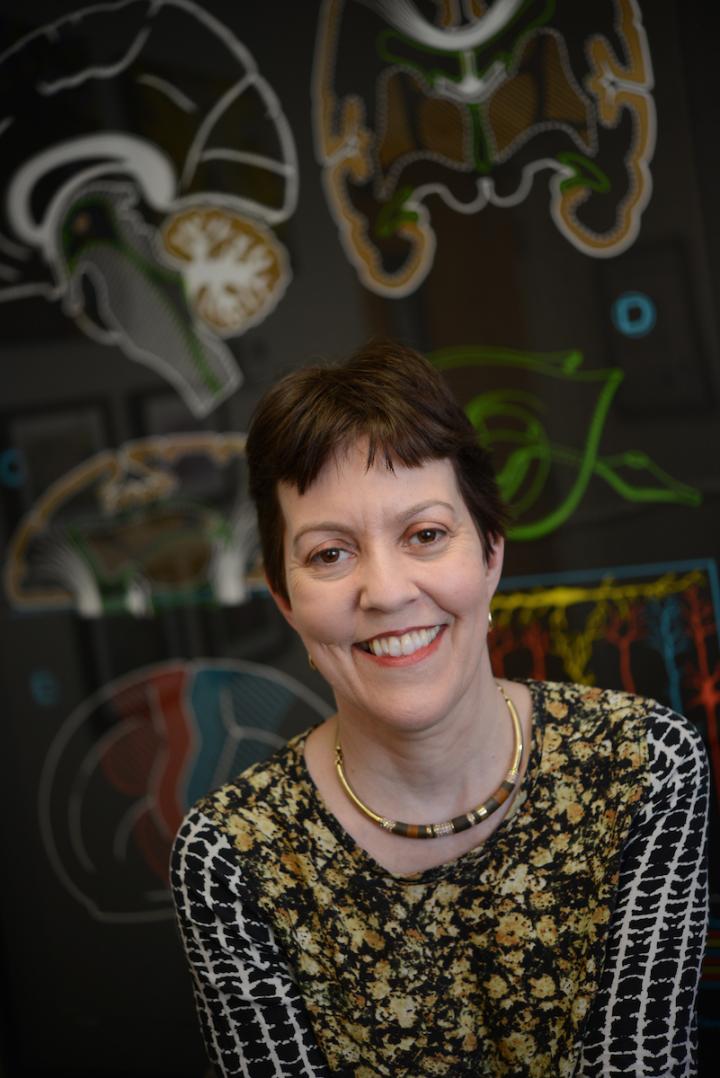UC Riverside-led national survey of MS specialists finds nearly 10% had been redeployed to the front lines of COVID-19 patient care

Credit: C. Rosema.
RIVERSIDE, Calif. — A survey of U.S. multiple sclerosis, or MS, specialist clinicians reveals the COVID-19 pandemic has created major changes in how they deliver care.
“Since the pandemic began, more than 95% of our survey respondents reported using telehealth platforms to provide care for their patients,” said Dr. Elizabeth Morrison-Banks, a health sciences clinical professor of neurology in the School of Medicine at the University of California, Riverside, who led the survey reported in the journal Multiple Sclerosis and Related Disorders. “Approximately one half of the respondents were MS specialist neurologists, four out of five of whom indicated that COVID-19 had changed how they were recommending and prescribing MS disease-modifying therapies.”
During the pandemic, the MS specialist neurologists tended to prescribe fewer immunosuppressive agents. Survey respondents also commented on their perceived level of safety and support in the workplace during the pandemic. Most indicated they had access to adequate personal protective equipment, but fewer than 50% reported they had adequate ability to physically distance themselves at work. Nearly 10% of respondents reported they had been redeployed, most commonly to the front lines of COVID-19 care.
“Our findings point to profound changes in MS clinical practice since the onset of the COVID-19 pandemic,” said Morrison-Banks, who directs the Multiple Sclerosis Program at UCR Health. “For better or for worse, when clinical practice patterns change, we should not be surprised to see corresponding changes in patient outcomes.”
Survey respondents included some of the most highly trained MS specialists in the country, considered to be thought leaders for other clinicians in their disciplines.
“Their collective shift, on average, in prescribing fewer of the highest-efficacy immunosuppressive therapies could potentially translate into patients experiencing more MS disease activity,” Morrison-Banks said. “We don’t, however, have enough information yet about COVID-19 outcomes in patients receiving immunosuppressive treatments. We suspect many respondents were decreasing use of certain MS disease-modifying therapies that suppress the immune system — for example, B-cell modulating agents — because they were concerned these agents could trigger severe complications from COVID-19.”
Shortly after the COVID-19 pandemic began, Morrison-Banks attended a virtual MS meeting in which the discussion turned to how MS specialists were responding to the pandemic.
“Sharing our mutual interest in how our colleagues around the country were dealing with the challenges of COVID-19 led to this national survey,” she said. “We did our best to collect and disseminate the survey’s data as early as possible during the COVID-19 pandemic with the hope that the results will be of use to clinicians and people living with MS. Our finding that nearly 10% of survey respondents reported being redeployed because of the viral pandemic led us to consider the extent to which the pandemic has challenged the capacity of the MS health care work force.”
Morrison-Banks stressed that people living with MS need consistent support from their clinicians to ensure they receive the best possible health care.
“We hope people living with MS will not avoid seeing their clinicians because they’re afraid of getting exposed to COVID-19,” she said. “Our survey suggests the vast majority of MS specialists are offering at least some telehealth services so their patients can feel safer as they continue receiving care.”
Next, the team plans to study how clinical practice patterns in MS care will change as more research data are published over the upcoming months, including from ongoing studies exploring how various MS disease-modifying therapies affect outcomes from SARS CoV-2 infection.
###
Morrison-Banks was joined in the research by Katelyn Michtich at the Southern California and Nevada chapter of the National Multiple Sclerosis Society; and Dr. Carrie M. Hersh at the Lou Ruovo Center for Brain Health in Las Vegas.
The research paper is titled “How the COVID-19 Pandemic Has Changed Multiple Sclerosis Clinical Practice: Results of a Nationwide Provider Survey Multiple Sclerosis and Related Disorders.”
The University of California, Riverside (http://www.
Media Contact
Iqbal Pittalwala
[email protected]




